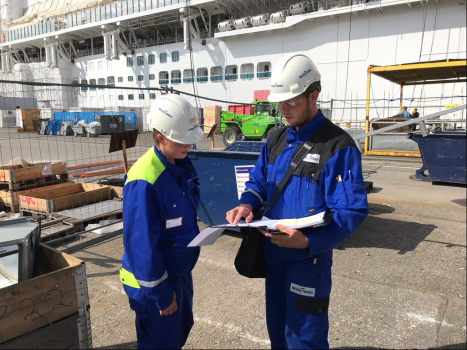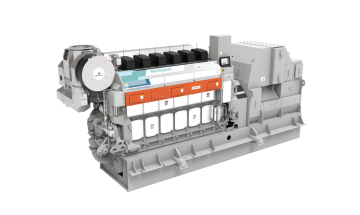
Future growth requires diverse expertise – “Recognise the need for expertise in time”
The marine industry is one of the most significant branches of Finnish industry – and it has scope for growth in the future, too. During the next two years, the industry will require several thousands of new skilled employees. In addition to building and fitting out ships, the industry constantly requires entirely new kinds of expertise to harness new technologies and the benefits of digitalisation.
Ilari Graf (on the right in the picture) works as Product Structure & Development Specialist on passenger ships at Meyer Turku shipyard. During his studies, his youthful dream of working on space technology was replaced by seas and ships.
Graf appreciates the culture and flat hierarchy of his workplace, which encourage commitment. The marine industry attracted him thanks to the versatility and international nature of the work as well as the opportunity to contribute to this industry of the future.
“In this job, you can be proud because everyone is ambitious about their work and gives it their all. Investments have been made in product development in recent years – and further outlays will be required in future, too,” says Graf.
Finland is a forerunner in the marine industry
Finland has much to give to the industry. In particular, Finland has a wealth of expertise in the Arctic and the construction of cruise ships.
“In addition, we have focused on developing construction techniques. Internationally, Finland has received praise for reliability and sticking to schedules. For this reason, we should foster Finland’s long tradition of shipbuilding so that we can hold on to our expertise in the future as well,” says Elina Andersson, Secretary General of Finnish Marine Industries.
Work for those interested in learning and development
Outsiders to the marine industry might think that it’s all about traditional shipbuilding – but digitalisation and automated processes are part of day-to-day work in both product development and production.
Ilari Graf currently works on the digitalisation of the production phase and solves problems related to the adoption of new technologies.
“New technology has enabled new ways of distributing information, organisation and cooperation, both internally and with customers,” he says.
Graf says that the best part of his work is the bold visions of the future floated in the industry. He feels that his future also lies in innovations. His career dream involves heading up work on innovations.
To those interested in the industry, Graf has a piece of advice: you should always want to keep learning new things. It’s also important to have the ability to identify what things you should know and what kinds of expertise you need to develop. Going forward, the industry will continue to need people with an independent attitude who can get things done. You can already develop these skills during your studies.


